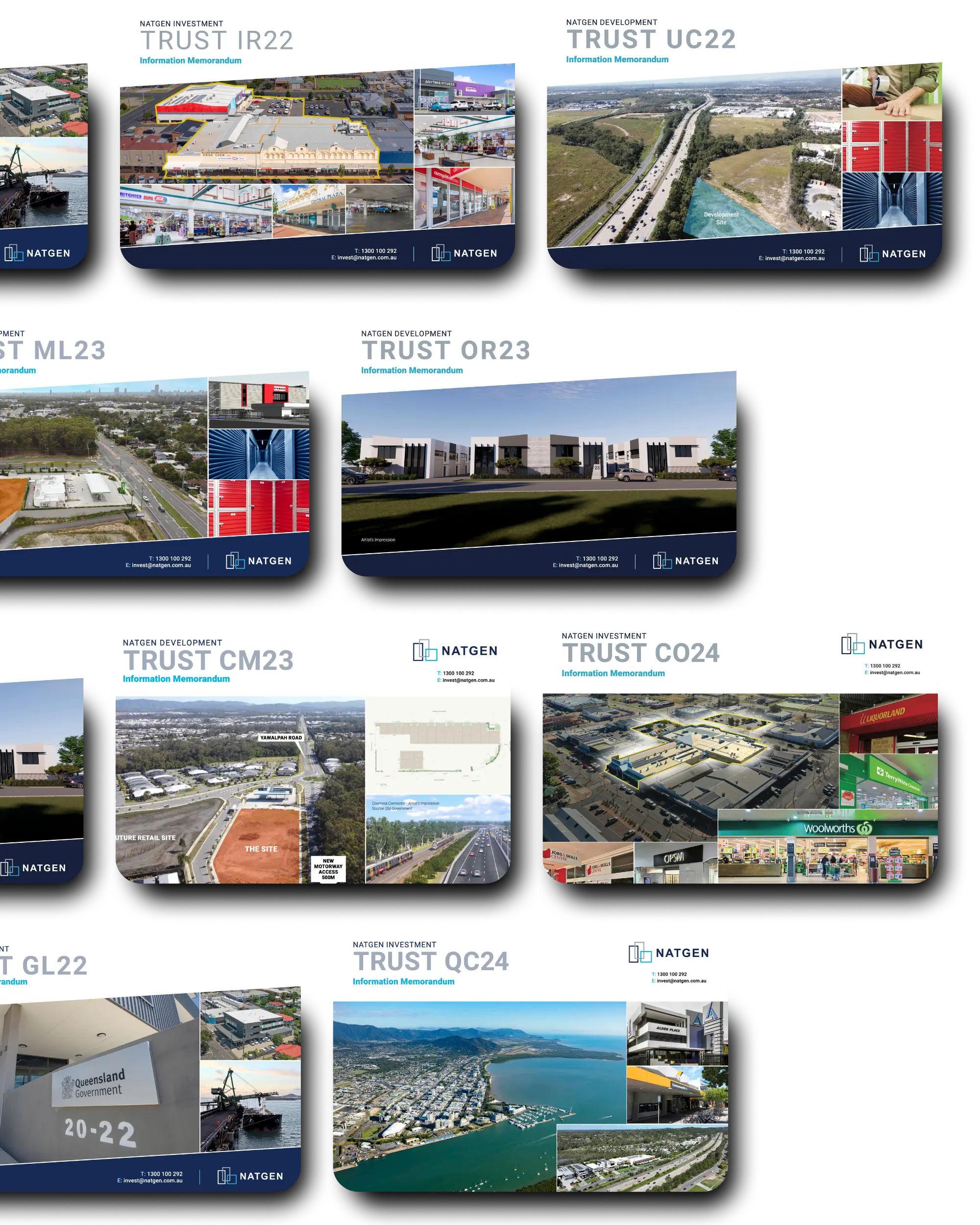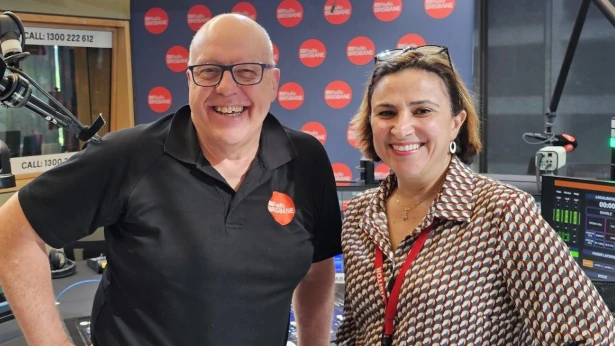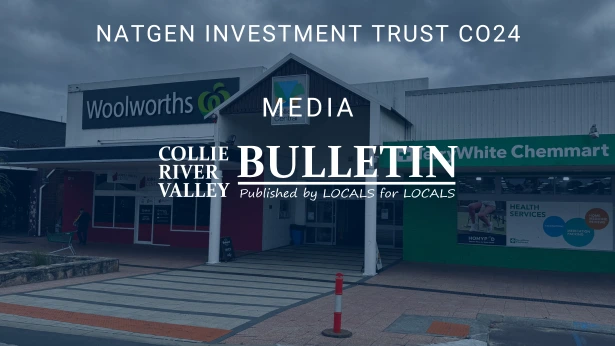Natgen exists to provide our clients with well-considered, risk-managed investment opportunities and quality strategic advice. We base our decision-making, advice and investment offers on careful measurement and analysis, and combine this with our management experience to arrive at quality solutions.
1,400+ followers
Peta brings over 25 years’ financial service experience gained in funds management, and wealth management. As a top performing fund manager, Peta managed institutional cash and fixed income portfolios (in excess of $5b) for Suncorp Investments, and as an Executive Leader, led ASX listed Cromwell Property Group’s Retail Funds Management business. At Natgen, Peta provides our funds management business with further depth and leads the development of new Natgen investments for the benefit of our Unitholders.
Steve has had a varied career at the ABC from researcher for 7.30 Report to producing Stateline, as well as ABC Radio news and presenting the Queensland Statewide Evenings radio program.Steve’s love of Brisbane and passion for fighting the good fight ensures lively and informative conversation every morning on ABC Brisbane.
ABC Radio Brisbane.
You’re listening to Steve Austin.
So inflation has come down a bit, not earth-shattering, but a little bit.
What does it mean here in Brisbane, the household, the mortgage, the food?
Peta Tilse is head of funds management at NatGen.
I should also mention that Peta is the mother of three boys
who consume more food than a football team, apparently.
Peta, thanks for coming in.
Spot on, Steve.
So what’s happening in households when inflation has come down a bit,
but it’s still hanging around, Peta Tilse?
What’s going on here?
I mean, I can talk anecdotally, Steve, but we’ve actually got data to prove it, right?
So, I mean, even yesterday, we’ve had the Commonwealth Bank saying that
it’s actually mum and dad’s young families that are feeling the pinch at the moment.
So that’s in their data.
We’ve also had Coles and Woolworth’s report this week.
So we all need to spend money on fruit and veg and meat and everything.
You can’t avoid it. You have to eat.
Can’t avoid it.
So between them, they’ve made about a $3 billion profit,
which isn’t huge in the scheme of things.
It’s probably like, I don’t know.
To me, it sounds a lot, but for a giant company like that all over Australia,
it’s not that much.
But what Coles, Coles’ CEO actually came out and she was talking about
the various trends that they see.
So don’t forget these guys not only can look at the sales data,
they’ve got that flybys and all that sort of stuff,
that deep data that they can look at.
And there’s things like No Meat Mondays.
There’s high sales of the own brand products, so the cheaper options.
People are buying the cheaper cuts of meat.
So maybe having sausages instead of chicken or instead of red meat
and only buying things on sale.
And to be honest, I can vouch.
That’s what I do.
You only buy on sale now.
Things are so tight.
Well, it’s not tight.
So you focus on it?
Yeah, it’s more that if you can buy yogurt for school lunches
when they’re 50% off or 30% off, why wouldn’t you?
So I give the kids the phone to get their favourite flavours, etc.
And I say, right, you can only buy the stuff that’s on sale.
And then because you just wait another week and there will be a sale.
So, you know, there’s a little bit of…
In this inflation data, fresh fruit and vegetables,
the prices are still going up.
Correct.
So the inflation data was interesting.
I mean, this is a pulse.
This isn’t the official CPI per se,
but it is showing that it’s moderating.
The electricity rebates that we’ve seen within the state,
like Queensland and WA, apparently,
the two states that sort of got captured in this data.
If you actually excluded the electricity price rises…
Sorry, the rebates, I should say.
Electricity prices actually went up 0.9%.
So, yeah.
If not for those rebates,
electricity prices are still going up.
Correct.
And around the country, there’s federal rebates,
and that’ll be coming through in September…
Sorry, in the August numbers,
which will be reported this coming month.
In Queensland, we had car registrations.
We’ve got 20% discounts.
We’ve got the 50 cent fares,
and WA’s got something similar going on.
The federal rent assistance is not actually
in this particular data point,
so it’ll come this next month.
And we’re seeing disinflation,
so things are cheaper for clothing, footwear,
and some other household items like couches and things like that.
So things you can delay buying or delay purchasing?
Not necessary stuff.
Not necessary stuff, but stuff you have to buy.
But fruit and veg.
It’s going up, up, up.
Petrol, food, fresh fruit and vegetables.
Rent.
Rent.
Phenomenally.
You raised your eyebrows.
Rent is a really troubling one, by the way.
Well, it is for everybody, right?
Like, you’ve got to live somewhere,
so…
And if you’re a owner-occupier
and you’ve got a mortgage,
well, you know, you’re clearly filling the pinch there,
and if you’re renting and you’re an investor renting,
sorry, with an investment property,
you have to pass on the borrowing costs.
So that’s where the interest rate thing kind of kicks in.
How would you describe those electricity rebates?
Are they a Band-Aid or are they something substantive?
I would definitely call it a Band-Aid.
I mean, it’s helping right now,
but we’ll, like, get us through this.
I mean, we’re probably staring down the barrel
of higher unemployment coming as things slow down.
Investment spending…
There’s been other data points out, retail spending’s coming off.
So let me jump on that.
Every time I buy a coffee for somebody,
I ask them how’s business,
and they go ashen-faced, particularly in hospitality.
But retail looks like it’s really in serious difficulty.
How would you describe it, Peta?
That’s my… You know, what would a journalist know?
How would you describe it?
Well, look, I mean, there’s a lot of cost pressures.
I mean, they’ve still got electricity costs, too,
just like a household.
And they’re going up.
And it’s going up.
And things need to be transported to them and so forth.
So it all kind of builds.
And the way around it is to have better productivity.
I mean, if you’re running that coffee shop,
and you’ve got a 15-year-old working for you
and you want to open on a Sunday,
I actually didn’t know this until my kids were actually working at Mackers.
But there’s a deal done with unions and McDonald’s,
and this happens with a lot of the big businesses,
where instead of paying two times the going rate,
so $8.80 an hour or whatever it is that they would be getting…
On weekends or something.
So instead of getting sort of almost $17-ish, whatever that would be,
they’re getting $12 an hour.
So there’s…
So McDonald’s, with a union, did a special deal to pay the young kids lower rates.
So McDonald’s had… Different loading.
Different loading.
So McDonald’s have a competitive advantage on weekends
when it compared to other hospitality or cafes and food shops or food stores.
And so it means that that little 15-year-old catching the bus in OK Shul
it’s $0.50 at the moment.
But what if it was a $5 fare from wherever they’re going to,
if they’re coming into the city or something like that?
There goes half your pay.
And then there’s rules around how long you can work,
so four hours at a time and things like that.
So, yeah, it’s all…
There’s things that we need to improve with productivity
and, yeah, just sort of the other sort of inputs into what we’re producing.
Peta Tilse is head of funds management for NatGen.
She’s also a mother of three boys.
This is 612 ABC Brisbane.
You travel around parts of Queensland for your company.
What do you see economically?
What do you see because you travel outside of the southeast city built-up area?
Sure.
So this week we were out at Toowoomba and then sort of out at Dolby.
A hell of a lot of activity, which is great for the local economies.
But we dropped into one of our…
We’ve got IGA shops as part of the investment portfolio,
but dropped in to have a look at it and see what the activity was like.
I was walking around the meat aisle and you’re going to laugh at this,
but I see I fill it at $19.99 a kilo and I think, oh my God, that is cheap.
So I’m with my boss and here I am walking around with the two kilo thing.
I fill it because I’m like, I’m going to feed my children this.
And then I was with another colleague and she went, yeah, that is cheap.
And the reason it’s cheap, Steve, is when you go to Coles or Woolies,
it’s like $70 a kilo.
So that’s the difference.
And why is it so different?
Is it just because it’s a regional area or is it because it’s an IGA
compared to a Coles or Woolies?
It could be either or it could be both.
But people in the land are actually complaining about cattle prices.
So someone’s making money there.
I have to go to news in a moment.
What does this say about the federal government’s moves to tackle inflation
or the RBA’s moves to tackle inflation?
Well, they have to do what they have to do,
but they also talk in the papers at the moment that maybe they shouldn’t
be looking at inflation.
They should be looking at broader base things.
But their mandate is to have a stable economy.
They have a federally set mandate.
They’ve got to get it down.
And it impacts all of us if they don’t rein it in.
And is the federal government helping get it down or hindering?
They’re spending a lot.
That’s hindering.
That’s adding to it.
Peta Tilse, thanks for coming in.
Peta Tilse is head of funds management for NatGen.



















New $100m self-storage facility opens on former Molendinar factory site The Gold Coast’s shrinking living...
Keeping store and order A $100m self-storage centre has replaced the former site of a...
Central celebrates 20 years Collie Central Shopping Centre recently marked a milestone in receiving a...
New $100m self-storage facility opens on former Molendinar factory site The Gold Coast’s shrinking living...








1,600+ followers